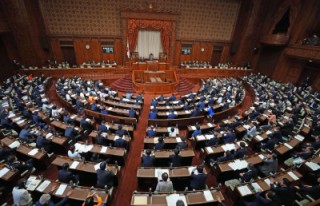Loading
Search
▼ Japan Enacts Law To Set New Rules Against Election Poster Opportunism
- Category:Other
Japan's parliament on Wednesday enacted legislation to set new rules designed to prevent candidates from using inappropriate tactics, such as presenting images of scantily clad women, on election posters to promote themselves, their candidacies or even products.
In official campaigning for last year's Tokyo gubernatorial race, many people ran primarily to gain fame through broadcasted campaign debates and posters, causing concern that the election process was being undermined for personal gain.
The revised public offices election law will take effect one month after its promulgation, probably in time for the Tokyo metropolitan assembly vote in June and the House of Councillors race this summer -- two of Japan's key political events in 2025.
The supplementary provisions also clarify that necessary measures will be implemented to stop candidates from using their own campaigning resources to help another's chances of winning, a tactic labeled a "two-horsepower" candidacy in Japan. Action is also being taken to combat the spread of false information on social media.
Under the revised legislation, campaign posters must not contain content that harms the reputation or dignity of other individuals or political parties, while being required to clearly display the names of candidates.
Anyone who uses a poster to advertise a specific product will face a fine of up to 1 million yen ($6,670).
Dissemination of false information on social media and two-horsepower candidacies have become more prevalent since the gubernatorial race in Hyogo Prefecture, western Japan, in November, which drew nationwide attention.
In the election, Takashi Tachibana, head of a fringe political group, ran with the express intention to help the eventual winning candidate, Motohiko Saito, who was removed as governor after a successful no-confidence motion was moved against him over accusations of power abuse.
Tachibana, an unconventional politician with around 800,000 YouTube subscribers, has also been criticized for spreading false information on social media about a rival of the candidate he backed.
The ruling and opposition parties have already begun debating how to regulate such matters, but they will continue discussions cautiously out of concern that the move could restrict freedom of expression, lawmakers said.
In official campaigning for last year's Tokyo gubernatorial race, many people ran primarily to gain fame through broadcasted campaign debates and posters, causing concern that the election process was being undermined for personal gain.
The revised public offices election law will take effect one month after its promulgation, probably in time for the Tokyo metropolitan assembly vote in June and the House of Councillors race this summer -- two of Japan's key political events in 2025.
The supplementary provisions also clarify that necessary measures will be implemented to stop candidates from using their own campaigning resources to help another's chances of winning, a tactic labeled a "two-horsepower" candidacy in Japan. Action is also being taken to combat the spread of false information on social media.
Under the revised legislation, campaign posters must not contain content that harms the reputation or dignity of other individuals or political parties, while being required to clearly display the names of candidates.
Anyone who uses a poster to advertise a specific product will face a fine of up to 1 million yen ($6,670).
Dissemination of false information on social media and two-horsepower candidacies have become more prevalent since the gubernatorial race in Hyogo Prefecture, western Japan, in November, which drew nationwide attention.
In the election, Takashi Tachibana, head of a fringe political group, ran with the express intention to help the eventual winning candidate, Motohiko Saito, who was removed as governor after a successful no-confidence motion was moved against him over accusations of power abuse.
Tachibana, an unconventional politician with around 800,000 YouTube subscribers, has also been criticized for spreading false information on social media about a rival of the candidate he backed.
The ruling and opposition parties have already begun debating how to regulate such matters, but they will continue discussions cautiously out of concern that the move could restrict freedom of expression, lawmakers said.
- March 26, 2025
- Comment (0)
- Trackback(0)


